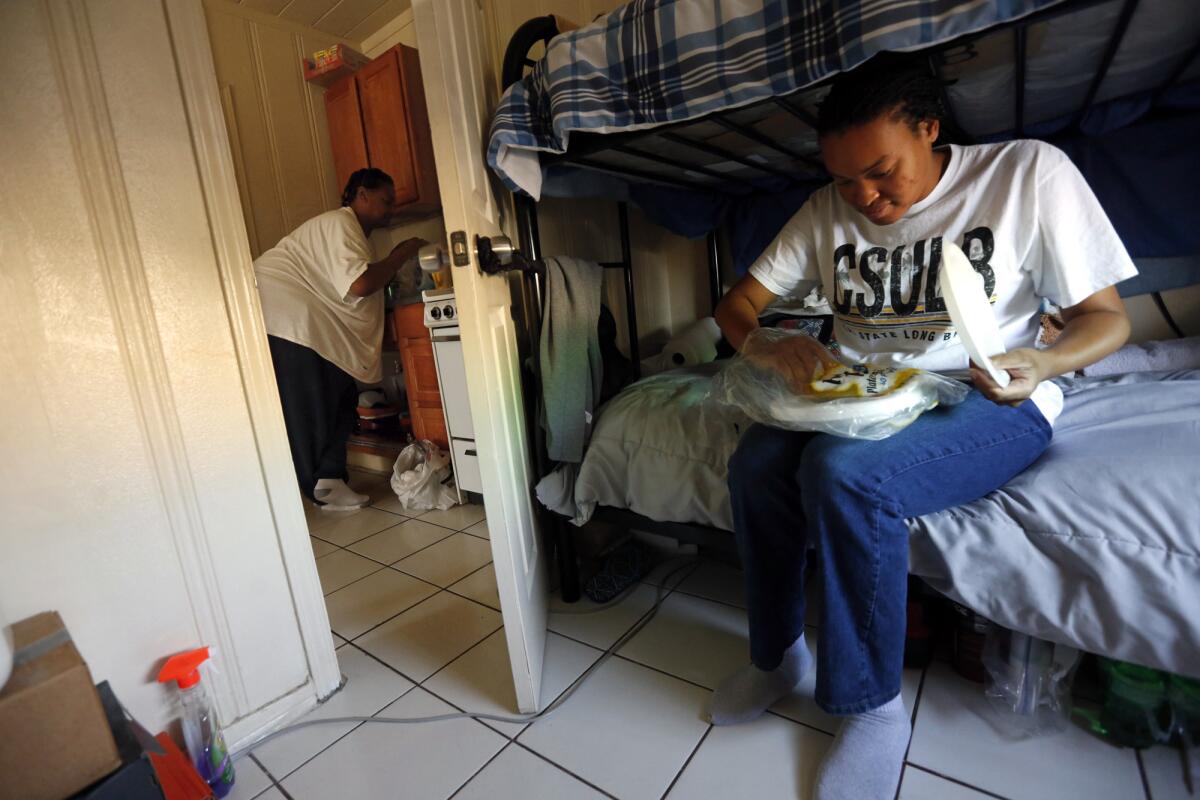California college students’ biggest struggle is juggling jobs to pay for food and housing, survey finds

- Share via
Nearly two-thirds of California students say their biggest obstacle to succeeding in college is costs—including food and shelter—and juggling jobs with school, according to a survey released Thursday by the California Student Aid Commission.
More than one-third of the 15,000 students who responded to the survey said they lacked stable housing and a steady source of food in the last month. Students in rural areas expressed the greatest hardship: 41% of Central Valley residents reported housing insecurity while 47% of those in the North Inland — the area of Shasta, Butte, Lassen, Plumas and Siskiyou counties — said they did not have regular access to sufficient nutritious food.
Among Los Angeles students, 30% reported housing insecurity, the lowest level in the state, and 33% faced food insecurity, the third-lowest level after the East Bay and wine country areas.
African American students faced the greatest struggles. More than half reported they lacked regular access to nutritious food and 40% said they did not have stable housing, the survey found. About 4 in 10 Latino students faced similar hardships, with about 3 in 10 Asian Americans and whites reporting such difficulties.
“Far too many students do not have the financial means to cover the real costs of college, nor do they have access to sufficient aid,” Marlene Garcia, commission executive director, said in a statement. “In many cases, they are skipping meals, sleeping in cars, or otherwise going deeper into poverty with crushing loan debt. This is unacceptable, and we must address these direct needs immediately.”
Brenda Contreras, a UC San Diego senior majoring in political science, works three jobs to make ends meet, a workload that exhausts her.
“You’re going to class in zombie mode,” she said. “Lots of of students are pushed to the edge.”
Financial aid covers her tuition and some housing. But she said she struggles to earn enough money to pay for books, transportation, cell phone and medical insurance. She also helps support her two younger brothers and mother, a single parent whose arthritis limits her hours as a housekeeper, putting her family below the poverty line.
Contreras said low-income students like her must choose between higher-paying blue collar jobs, such as custodians or bus drivers, and unpaid or lower-paid lab research positions or professional internships that are related to their career paths. She said rent control on housing — by far the highest non-tuition cost — would help ease her struggles.
For the first time in more than 10 years, the commission conducted the survey from all five segments of California higher education: the University of California, California State University, California Community Colleges and both nonprofit and for-profit private institutions. More than 150,000 students received an email invitation to participate and 15,419 responded during the 2018-19 academic year via an online and mobile-friendly survey platform designed in partnership with the College Futures Foundation and Mathematica.
Overall, 64% of students said their success is obstructed either by college costs (33%) or the struggle of balancing school and work (31%).
The survey underscored the high costs of college beyond tuition. Students reported spending an average of $1,991 per month on textbooks, rent and utilities, food, transportation, and other personal expenses essential for attending college. But students with dependents said they spend almost twice as much, with higher costs also reported by students older than 25.
Anonymous students described their difficult trade-offs in trying to manage school and work on limited incomes.
“In order to afford college…I was working 36 hours to help pay both family expenses and my own during the school year and full time during the summer just to get by. However, my grades suffered dearly as a Computer Science major. I am now working less hours, but I do not have enough for food or health,” one student from the Sacramento area wrote.
“This survey allows us to hear directly from students, and they are telling us that they are faced with insurmountable pressures and impossible trade-offs,” Monica Lozano, College Futures Foundation president, said in a statement. “Completing a college education is critical to the long-term success of these families and our state as a whole — but paying rent and putting food on the table are not optional. They shouldn’t have to choose.”
The Student Aid Commission, a state agency responsible for administering financial aid programs for students attending public and private universities, colleges, and vocational schools, plans to discuss follow-up action at its meeting Thursday in Sacramento.
More to Read
Sign up for Essential California
The most important California stories and recommendations in your inbox every morning.
You may occasionally receive promotional content from the Los Angeles Times.














